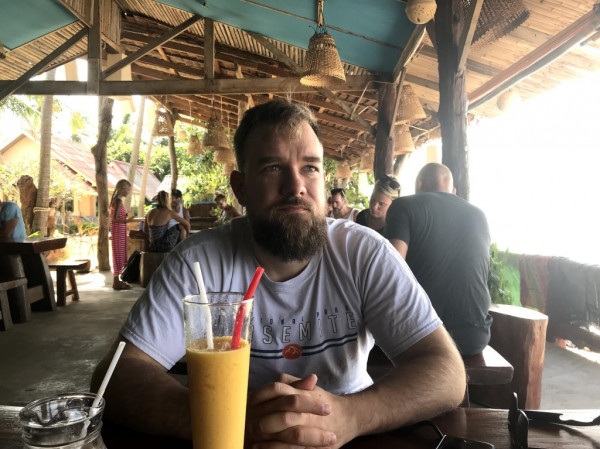
Interview with Artur, an engineer who found purpose as an Intrapreneur
How did you get started with remote work?
At some level, the idea to work remotely was obvious to me. I started my career as a web development freelancer and working from home was the only option at 15 (and a bit illegal in Poland).
After learning hard lessons about what not to do in your own business, I moved to Samsung Poland, which was a radically different experience. I was enamored by beautiful office space, benefits, and the scale. From that experience, I knew that I wanted to work for big companies.
Me being me, I negotiated my salary down (how often do you hear that?) in exchange for being able to work remotely 80% of full time, which allowed me to travel a bit. I never spent a day working full-time office-bound.
What ultimately launched me on a quest to find a new and remote position was the drive to work on more significant problems, having more impact and working on a product that people will recognize. I wanted "in" on the Silicon Valley startup culture (which since has lost much of its luster), and I wanted to work on the "hip" things.
Also, I did not want to leave Poland permanently. My family is here, and I didn't want my grandparents to lose their only relative.
With my prior WordPress experience, Automattic was a perfect fit. I spent a lot of time preparing and leveling up my skills to apply. You can read a detailed account of that process here. It also includes a guide to using sandwiches as a competitive advantage.
I got hired one week before the whole company met in Park City, Utah. It was 3.5 years ago, and it's as exciting now as it was then.
Read 114 answers from other remote workers
What are you working on?
Automattic is the company behind WordPress.com — a platform for starting a website (or a blog) quickly and without any hassle.
I care deeply about helping people earn money and focus on tools and features that let them sell products or services and market them on the Internet.
I started as a JavaScript engineer, but with an education in both psychology and computer science, I always liked to blend disciplines and had trouble with boundaries (primary school teachers did not appreciate this). However, over these three years, I have been able to shape my role and call myself an Intrapreneur.
My goal is to get stuff done and provide customers with the best possible tools to accomplish their own goals.
Sometimes that means implementing a new feature, convincing a team to tweak their existing project, or advocating for a particular approach.
Any work environment is teeming with potential and people wanting to accomplish things. Your programmers may have a great understanding of the publishing business; marketing folks may have great UX ideas, and system admins can come up with excellent copy.
Bigger businesses tend to silo people in their job description responsibilities. This tactic results in the whole company working towards having a cleaner codebase, nicer designs or slicker social media campaigns. However, nobody will work on the actual thing that makes the customer happy.
The customer does not care if your front end team has recently updated its data layer approach to the latest framework. Conversely, in small businesses, entrepreneurs are responsible for everything, and no task falls outside of their responsibilities.
They want the job done. Period. They can never say "Oh, we did all we were responsible for, and the failure is the other team's fault."
That dose of accountability and ownership resonates with me, but I don't want to run a small business (I've learned that lesson early in my life). That is how I arrived at being an Intrapreneur.
I've recently lead a project that provides remarkably easy Mailchimp integration, and now I am working on a billing system that will empower users to sell goods and services with less friction than ever before possible on a WordPress site.
Read 107 answers from other remote workers
What's your typical work routine?
I try to start my day with one of the following:
- Running
- Tony Robbins priming
- Wim Hoff breathing exercises and a cold shower
Then, I try to journal. The purpose is to dump any lingering thoughts on paper, so they are not cluttering my mind anymore.
Persistent or frustrating thoughts have a way of coming back and something as easy as writing it down purges them from consciousness.
I fail to do this more often than not though. So, I manage to write everything down every 3rd or 4th day.
The ideal next thing is to jump straight into the hardest thing to do on my list. I am most productive in the mornings, but with the European Union and United States time difference, there is always something that happened during the night that needs a reaction.
The hardest part is judging what is hard or more important. Sometimes it is an intricate implementation detail, but with each year I am discovering that dealing with people is more important, effective and difficult. Though, separating signal from the noise is tougher in communication than in code.
I would love to reserve the "unfocused" tasks for the post-lunch energy slump, but it is hard to judge and quickly recognize what these tasks are.
When I am home, communication happens in the late afternoon or evening. I am about six timezones ahead of my coworkers, so they tend to come online later in my day.
Some of the days I can follow the above schedule. In others— life intervenes. My grandpa is getting older and needs our care, we recently ran a full-on apartment renovation, and we are currently in the process of organizing a wedding. So, we have a lot of "life" thrown at us (I'm sure having kids feels this way, and I am not looking forward to that particular aspect).
When I have errands to run, I sacrifice my beautiful morning routine to get stuff done. This happens so often that I count this as a typical thing. I jump out of my bed, scramble like crazy to deal with whatever I have to and dive straight to work whenever I can.
If you have to deal with your family, you will not be able to do the morning thing every day. Start once a week and experiment with different approaches to determine what works for YOU. I found that meditation is not for me, but spending time outside helps me a lot.
Read 92 answers from other remote workers
Do you have a dedicated space to work?
Plenty!
My fiancee —who also works at Automattic— and I recently bought an apartment, and we have sacrificed one of the rooms to serve as the office. It is furnished with a Herman Miller Embody chair and an Ikea Bekant standing desk. However, in all honesty, I have not yet tried the standing desk.
The biggest enemy of working from home is the fridge. I can hear it calling me to check what is inside. Also, somehow there is always so much to do at home that I get distracted by laundry and other chores.
Since WeWork recently launched in Poland, I also rent a space there. I was pleasantly surprised by the community and the benefits of leaving home. For example, it's somehow easier to hit the gym on the way back home than to leave the house specifically for that reason.
Paying for both a home office and the coworking space is a bit extravagant, but fortunately, Automattic helps pay for the coworking space.
Also — on top of that—we travel for about 100 to 120 days per year. By no means are we approaching nomad territory, but this is a significant amount and has to be taken into account.
For example, I consciously bought an Apple Magic Keyboard for my desk setup, because it has keys similar to the ones on my laptop. That way, switching to laptop-only mode needs no adjustment.
Read 93 answers from other remote workers
What tools do you use to stay productive?
This list is in no particular order:
- Alfred for running everything on my laptop, with a full suite of custom workflows
- Trello for task management
- Grammarly for checking my writing
- Brain.fm for ambient noise and focus music
- Bose QC25 for noisy work environments
- PHPStorm for coding PHP & JavaScript, and Sublime for everything else
I use a MacBook Pro 13'' that I hook up to an external monitor at home and at WeWork. I have switched the keys in the laptop and the two magic keyboards to Colemak layout. I started having carpal tunnel symptoms, and this arrangement helped a lot.
I am also an Evernote junkie. A lot of my thinking happens there, and I have developed a set of custom tools. For example, every day I receive a journal entry created from a template that helps me start the day with the right questions.
I also try—and fail— to write a summary of every book I read. Every week, I get a book to review, and knowing that I have to write up notes makes me more mindful during the reading.
Read 108 answers from other remote workers
How do you stay on task?
Procrastination is my mind's natural response to the lack of clarity.
My attention starts to waver when I am not sure what to do next, so the easiest decision is watching the next cat video.
After I consciously internalized this, I know that I have to keep in mind the WHY. I need to be specific about the purpose of the task that I am currently performing. Knowing what success looks like and what it will mean for the end user helps me tremendously.
That being said, I am addicted to Facebook. I barely spend time there, but I still have muscle reflex of opening a tab and typing the social networks address.
I am angry at myself a few seconds after it loads, but I don't seem to be able to shun the habit. My latest attempt to battle this is blocking the facebook domain entirely on my laptop. I have deleted the mobile app more than a year ago.
Sometimes I still procrastinate, so I always keep one to two projects on the back burner. If I really can't focus on my main task, I use another project to procrastinate and switch contexts to refresh my mind.
Read 100 answers from other remote workers
What do you like about remote work?
In the beginning, I was enticed by travel, but what I love the most is how democratic it is.
I can be a kid from Nowhere, Poland and have the chance of working with the smartest people in the world. I can chat with our CEO, Matt Mullenweg, who wrote software that runs over 30% of all internet websites. I can also work on a product used by millions of people all over the globe.
Yet—and here is the kicker— I did not have to leave my hometown to do that! I can hang out with my grandpa or old friends. I can visit my mom and invite childhood friends for a party.
If office jobs were remote by default places like San Francisco, London, or New York would not have such a horrible housing crisis. Remote work would allow the charming neighborhoods of Lisbon or Brooklyn not to be taken over by the more affluent, and it would also result in the prevention of pollution since there would be fewer commuters.
If more people started getting well-paid remote jobs and started spending this money in small towns within Kentucky, Idaho or Ukraine, it would be intriguing to see how it would change these communities.
This is the future of remote work that gets me excited, and I started Deliberate and Remote to help this happen. I want to help people get hired remotely, make deliberate life choices, and stop running on autopilot.
Read 106 answers from other remote workers
What do you not like about remote work?
Loneliness has to be at the top of the list. As I mentioned earlier, my fiancee also works remotely in the same company. That, of course, has a whole suite of advantages, benefits, and dreadful pitfalls.
I am not alone, but we find ourselves in a bit of social vacuum. People over thirty generally have more trouble making friends than before.
Most of my friends are in the office. So, I have to make a deliberate effort to see another human being besides my fiancee (but she is a deity, so she does not count). This is one of the reasons we rent a coworking space.
The other thing is that flexibility has its price. When you take a break from work to do the laundry, the other errands start to pour in. So, strict work and life separation have its benefits. For example, after a stressful day, the commute back home is a nice bookend, and a chance to reflect and relax.
Working from home means that you bring your stress, annoyance, and irritation straight into your living room and to your family.
Read 103 answers from other remote workers
What did we forget to ask Artur Piszek?
At RemoteHabits we're always trying to improve our interviews, what question should we have asked Artur Piszek?
Biography
Artur Piszek
Artur Piszek is a Cognitive Engineer and self-described Intrapraneur at Automattic. When he isn't helping end-users to reach their goals at Automattic, Piszek manages Deliberate and Remote, a blog post that provides tips and resources for individuals looking to join the remote work community.
Work remotely? Share your story on RemoteHabits!
Want to be interviewed? If you have a remote position, head over to the interview me page!
Looking for a remote job?
RemoteHabits Jobs has everything you need to find your next great remote work position!
Related Interviews
Interview with Danielle, an author who found the benefits of coworking
Danielle's remote work journey led her to become an author—see how coworking with other remote workers and digital tools have helped her to fulfill her passion.
Interview with Melissa, a co-founder and remote work champion
Melissa started Work Well Wherever to help individuals & companies embrace remote work—see how she balances entrepreneurship, parenthood, & self-care.
Interview with Ben, a web developer who freelances from home
Learn the tips and tricks Ben uses to stay productive while working remotely on a hybrid team


